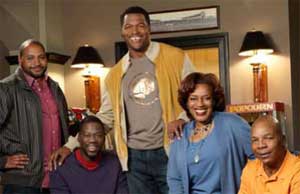[Bianculli here: Once again, I'd like to encourage you to click on the Fall TV Preview banner above the Best Bets and check out TV WORTH WATCHING's constantly updated analysis of the new fall shows. And today, keep reading to check out contributing columnist Tom Brinkmoeller's advice about taking advice, at least from critics...]

TV Star Ratings and Critical Raves: Don't Necessarily Believe Everything You Read
Along with the ads for Christmas layaway and robocalls from political wannabes, another sign of early fall has hit the atmosphere: reviews of the new TV shows.
Like computer-model hurricane predictions, these reviews serve the valuable purpose of telling readers when to run for cover. But just like the weather reporter who howls frantic warnings when anything monumental ever will hit land, some reviewers aren't to be taken seriously.
A few points to consider as we're immersed in the new fall TV premiere week:
1) Beware of the bite. When you see a review quote in an ad for a TV show, squint hard and look for the attribution. If the quote is from someone or some source you've never heard of, your faith in this new show should be guarded. If you can search the Web and find the source, see if it has any credibility.

If it's nothing but a site that spits out bite-sized quotes in the hopes they will be appropriated by an ad-writing flack, the site has all the credibility of a litter box. This reviewer has more enthusiasm than the show's executive producer. Ignore the hype. Far as I'm concerned, this rule applies to anything good said in a review of Hank or Brothers.
2) Too many stars is a sign of turbulence in the cosmos. Film reviewers who reward stars do so for a completed package. TV reviewers who award stars are doing so for a work-in-progress. On a five-star scale, no series ever has been born with all five. Five stars, if they are indeed a reflection of near-perfection, is something into which a TV series grows.
No matter how much one loves the current state -- or the memory of -- a series, a viewing of the pilot and the first season will show how much that series has grown. If a good series doesn't grow, it's like an artificial bouquet. It doesn't age, it just gathers dust.

3) Adopt a critic. You're here, probably, because of Bianculli. Doesn't mean he's the final word in quality judgment, but he's near the top in your (and my) mind. You've tested his reviews against your tastes and found a good match. (If anything I've written has resonated well in your taste area, you'll seriously consider my endorsement of The Good Wife and The Middle.)
Use the same criterion with others who review television. If your tastes match, give that critic your equivalent of five stars. If you never agree with a critic, that's valuable, too. Anything that gets positive comments from that person is almost automatically to be ignored. If that reviewer dislikes something, it may have some great redeeming values. (Avoid The Good Wife and The Middle if my writing causes you to shut down your computer.)
4) Believe in television's love of the mundane: If you like something new on TV and most critics hate it, know the show has a great chance of surviving. Conversely, if you hate something new and the best critics like it, know it is airing on borrowed time and almost surely will disappear very soon.
--
 Tom Brinkmoeller is ever mindful of the fact that "critic" and "cynic" can share more than similar-sounding syllables, if one is not very careful.
Tom Brinkmoeller is ever mindful of the fact that "critic" and "cynic" can share more than similar-sounding syllables, if one is not very careful.